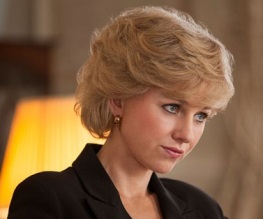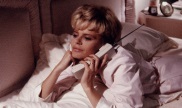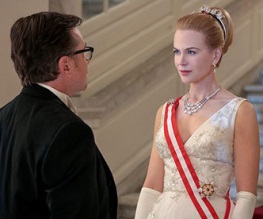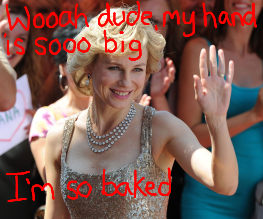Diana

This review was first published on Steven’s brilliant website Popcornaddiction.com. Make it your next stop.
Prior to her untimely death on August 31st, 1997, when the vehicle she was travelling in crashed in Paris’ Pont de l’Alma road tunnel, Diana (Naomi Watts) embarked on a relationship with London-based Pakistani surgeon Hasnat Khan (Naveen Andrews). This two-year period saw the Princess of Wales give a revealing interview with BBC Panorama journalist Martin Bashir, travel out to Lahore to meet Khan’s family, and risk her life on an Angolan minefield in the hope of outlawing landmines. As Diana’s high profile and media entourage begins to interfere with Khan’s work, however, they are forced to reconsider what they mean to one another, and what they want from their relationship.
Woman. Mother. Princess. Celebrity. Campaigner. Icon. Whatever your opinion of Diana there is really no denying that she was one of the most important, interesting and incendiary figures of the 20th Century. Indeed, she’s still occupying the press today, over a decade on from the fateful day that they are alleged to have run her off the road. Even without the tragedy (and resultant conspiracy theories) she lived a life which is fascinating to this day – from her relationship with the Royal Family to her charitable works after the fact. Unfortunately, and unfortunately, this isn’t the character explored in Diana; instead we get Naomi Watts in a wig, swooning after Sayid from Lost.
Admittedly, it’s a very good wig, or indeed series of wigs as it charts the numerous changes in hairstyle during the final two years of the Princess of Wales’ life, but there’s only so much time an audience can be expected to spend staring at the back of someone’s head. Yet Oliver Hirschbiegel’s film still spends an inordinate time doing just this, and for at least the first ten minutes the camera tracks carefully behind Diana as she walks around her Parisian hotel, and beyond onto the red carpet of some gala event. Rather than building anticipation for the inevitable reveal, it becomes clear that the filmmakers themselves have little faith in Watts’ likeness, and instead you actively begin to dread it.
Watts — as she is only too happy to admit — does not look like Diana, though on occasion she does manage to formulate her repertoire of head tilts and uncompromising glances into something genuinely reminiscent of the late princess. Her reactions to the press intrusions are also surprisingly impacting, while the CCTV images of her and her security escorts riding the elevator are as tense as anything out of Paranormal Activity 4. For the rest of the almost two hour running time it’s just Naomi Watts, particularly when the script calls for Diana to disguise herself in a brunette wig or submerge herself in a swimming pool. In the role of Hasnat Khan, Naveen Andrews doesn’t have anywhere near as much to live up to, but even without the inevitable compromise or pressure he still can’t craft a credible or interesting character from what he is given.
Ultimately, the script is Diana‘s biggest failing. While the story arbitrarily plucks vignettes from the last two years of her life, screenwriter Stephen Jeffreys fills them with dialogue so trite and banal that you have to wonder why they chose the part of her life that they did. As much an unimaginative rom-com as it is a thoughtless biopic, the film may as well have focused on the early years of her relationship with Prince Charles. To instead adapt one of the most confounding and controversial periods of the late 20th Century and not explore beyond a little-known and pretty uninteresting courtship deprives the film of relevance. The questions surrounding the film’s existence are almost as unanswerable as those around Diana’s mindset in those last few months.
It is possible that you will still come out of the film wanting to know more about Diana’s life and death, but if you do it will not be because of the probing questions and revealing insights of Hirschbiegel or Watts; rather, it will be because you are trying to remind yourself why someone who — if Diana is to be believed — didn’t know how to make a hamburger or thought that omniscience was the same as an omnibus is to this day considered one of the most important figures of modern times.





Recent Comments